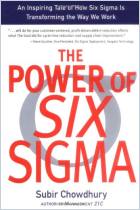
The Power of Design for Six Sigma
Recommendation
When last we saw Joe Meter, the fictitious hero of Subir Chowdhury’s last Six Sigma book (The Power of Six Sigma), he was looking for work. His friend Larry Hogan introduced him to Six Sigma, which made Joe a huge success. According to the story, which is a novelistic construct for conveying business advice, now Joe is going to tutor Larry on a more advanced form of Six Sigma, one that delves into the very process of system design. This “meta-Six Sigma” appears to be a natural evolution of the basic Six Sigma approach, namely, to uncover the root causes of defects, inefficiency and customer dissatisfaction – and to fix them as part of the intrinsic design of the company and its processes. This book covers the design concept, but not the initial details of Six Sigma itself. Here, Chowdhury again explains a complex subject in a lucid manner, if you don’t mind an alphabet soup of acronyms. This book will help anyone in management or anyone who is going through a change initiative.
Summary
About the Author
Subir Chowdhury is the author of nine books, including The Power of Six Sigma and Management 21C. The executive vice president of the American Supplier Institute (ASI), he speaks and writes internationally as a consultant on quality and management. His clients include Fortune 100 companies and small organizations, both public and private.






















Comment on this summary or Diskussion beginnen